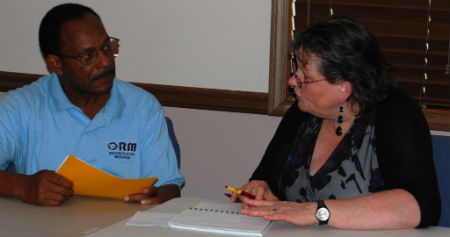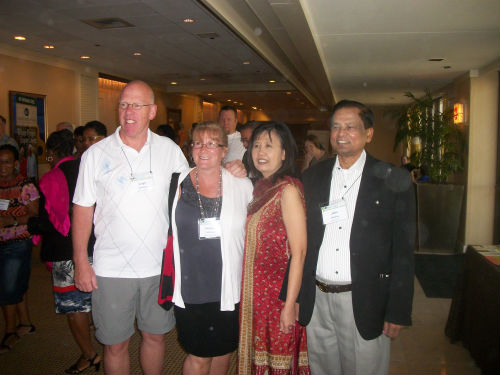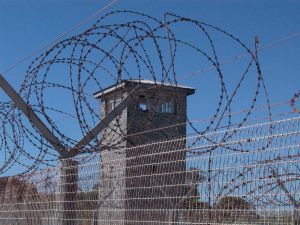Closing the Cycle of Violence: Beyond Emotions and Fears
By Neil Earle
 Office of Reconciliation Ministries (ORM) director Curtis May with Evelyne O’Callaghan-Burkhard. ORM's mission is put the teachings of Jesus Christ into action by advancing relationships between people of different beliefs and points of view.
Office of Reconciliation Ministries (ORM) director Curtis May with Evelyne O’Callaghan-Burkhard. ORM's mission is put the teachings of Jesus Christ into action by advancing relationships between people of different beliefs and points of view.With the murders in Las Vegas people are asking each other why. Facts never mentioned much – 1 in 5 of us have some sort of mental or psycho-spiritual challenges. Throw in an absent criminal father, a culture too addicted to violence and the tightening social pressures on all of us plus the human cry for significance and we are all susceptible to inexplicable and damaging outrbursts in the board room, the living room or the cabinet room. Reconciliation specialist Evelyn – a worker in Rwanda and Ireland – shows us a way forward.
Glendora, CA – Evelyne O’Callaghan-Burkhard is an Office of Reconciliation Ministries (ORM) Chapter Leader based in Cork, Ireland. She is also a well-traveled nurse and a lecturer on reconciliation.
A few years ago, Evelyne presented a lecture at New Covenant Fellowship in which she spoke to those concerned about reducing strife and conflict in our troubled times.
Her theme revolved around the practical “how to’s” behind the timeless teaching of Jesus to love our neighbor as ourselves. What blocks the fulfillment of this most elementary commandment?
In Evelyne’s view, even nuclear threats, extreme religious hostility and everyday violence traces largely to unresolved negative feelings and the deep-seated, unmet needs of people. This, she claims, sets us up for a cycle of violence, even when we are not aware of it.
 How pleasant to dwell in unity – Christians at GCI multicultural conference.
How pleasant to dwell in unity – Christians at GCI multicultural conference.Created for Love
“The creation account in Genesis says we are made in God’s image,” Evelyne adds. “This show we all have a capacity for love and relationships, but very early we read that pride, rebellion and selfishness short-circuited communications between the first man and woman and with God. Genesis 4 records the first murder.”
Murder, violence and other destructive acts flow from bitterness and resentment, says Evelyne, “chewing the cud,” stewing over real or imagined wrongs. This is amply demonstrated in the story of Joseph and his brothers. Genesis 37:2-4 mentions the timeless issue of sibling rivalry. “Joseph was given favor and acceptance, which led to competition, jealousy, a desire for retaliation and ultimate violence against him. Often the answer to the victimizing we feel is to go for CONTROL, seeing the Other as the enemy, seeing them as an object and ultimately perpetrating violence against them.”
Evelyne saw this cycle at work in her time in Rwanda. “There was the colonial period, which led the colonizers, and even Christian churches, to play off the ethnic groups amongst themselves. This only enhanced latent tribal rivalries after independence which ultimately led (after political failures to reconcile) to each one wanting to display power against the other. Many dictators take this route: When I don’t know who I am or my feelings are not acknowledged, this negative energy leads me to seek power over others.”
Problems/Perception
The history of the 20th century was too often a recurring series of groups seeking power at the expense of others to feel significant: Auschwitz, Korea, Biafra, Cambodia and Darfur today. One root source of a solution is, says Evelyne, answering the questions: “Who am I? What makes me, me?”
This is the well-known problem of identity. One’s identity has many sources. In Evelyne’s reconstruction: “We are each of us affected by our nation, our church, our neighborhood, our group, our personality, our jobs, our public and private selves. We carry hidden wounds from unresolved emotions. Our vision of the world is ultimately affected.”
All to often, the reality is that we see the world only through these filters. “Our perceptions shape our view of the world. It’s so easy to focus on our anger and our feelings instead of what we know to be our true reality, that we are made in God’s image, that we are made for relationships. This is because what we ‘know’ to be true cannot override our feelings and experiences. A person can say, ‘I know God is love, but I can’t get past my feelings.’”
 Mandela's prison at Robben Island – where he learned to overcome resentments.
Mandela's prison at Robben Island – where he learned to overcome resentments.What Is Central?
Here, for Evelyne, is the crux of the issue. “Christ is perfect love, holiness and justice. Perfect love casts out fear (1 John 4:18). A focus on him reminds us of his promise that we will receive all we need, that we will be filled. As he said, ‘He who believes in Me…out of his innermost being will flow rivers of living water’” (John 7:38).
Evelyne adds: Fear is the great inhibitor. Fear cripples. Fear prevents us from going beyond our feelings. It makes us afraid to risk, to risk love and to create loving relationships. “Our purpose in life is to enjoy part of the intimacy, the love that exists between the Father and the Son, as it says in John 14:23, ‘If anyone loves Me, he will keep My word; and My Father will love him, and We will come to him and make Our home with him.’”
God meets our needs and that in turn inspires us to serve God and neighbor in loving actions. “This is the kind of intimacy that bears fruit,” concludes Evelyne.
Hearing Evelyne’s presentation caused some in her audience to strive at being the change they seek in the world. Homemaker and grandmother Lucy Cantu commented: “On behalf of those who have to raise a granddaughter, I wish I could hear that talk all over again.” Graham Weakley, a Korean specialist living in Los Angeles, remarked: “Evelyne really got to the root causes of so many of our present distresses – national and individual. I wish everyone could have heard her.”